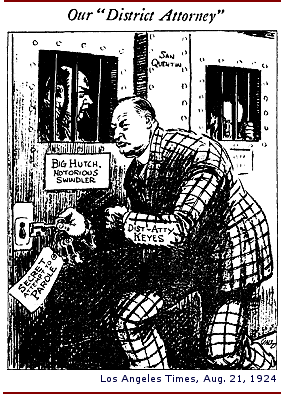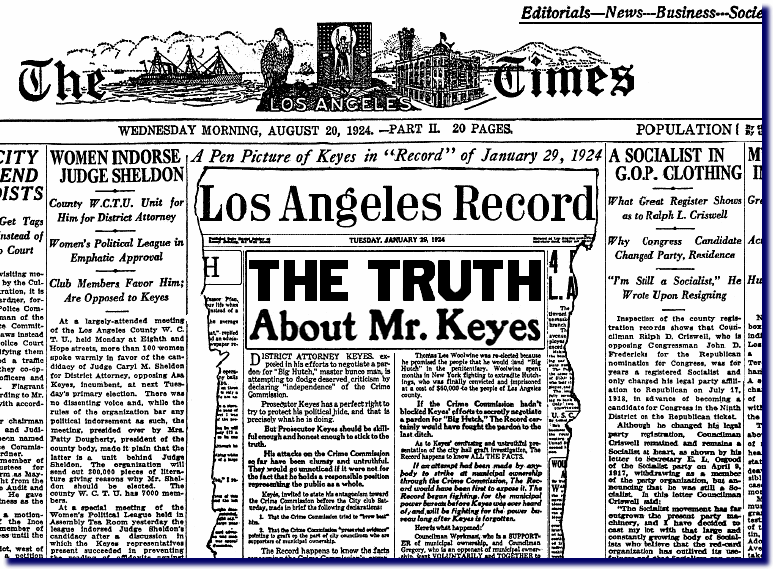Monday, August 6, 2007
Page 7
PERSPECTIVES (Column)
District Attorney Keyes Engages in Tiff With Publisher of L.A. Times
By ROGER M. GRACE
Forty-Third in a Series
ASA KEYES, sworn in on
June 6, 1923 as the 28th district attorney for Los Angeles County, was to
tangle with the publisher of one of Los Angeles’s daily newspapers…with the
allegation being hurled at the news mogul that he  coveted the role of a
political boss and was retaliating at the DA for not following orders.
coveted the role of a
political boss and was retaliating at the DA for not following orders.
If this scenario seems familiar, it’s because it parallels what took place during the administration of Keyes’s immediate predecessor, Thomas Lee Woolwine, whose resignation for health reasons paved the way for Keyes to be appointed by the Board of Supervisors to fill a vacancy.
Woolwine had found himself in combat with E.T. Earl, publisher of the evening Express and the morning Tribune. Earl, an early Woolwine supporter, was, it would seem, a local boss, of sorts, and did control some office-holders. He came to detest Woolwine for not becoming one of his yes-sir men.
It was not Earl with whom Keyes skirmished; Earl died in 1918. It was, rather, Harry Chandler, publisher of the Los Angeles Times. After Times owner Harrison Gray Otis succumbed in 1917, Chandler, his son-in-law, took charge.
Earl clearly turned on Woolwine out of spite. Allegations were made that Chandler picked on Keyes for that same reason.
![]()
The term to which Woolwine had been elected, which Keyes was serving out, was to end in December, 1924. Barely a year after entering office as DA, Keyes faced voters in a do-or-die Aug. 26 primary, there being only one opponent. Vehemently, the Times opposed Keyes.
In endorsing the challenger, Caryl Sheldon, a Police Court judge…at the lowest end of the judicial spectrum…the Times’ Aug. 17 editorial declares his court to be “the city tribunal devoted to cases involving violations of the prohibition law and one of the most important of the lower courts.” That would seem to inflate the significance of Sheldon’s post.
The editorial minces no words in explaining why the newspaper could not back the incumbent, saying:
“Keyes has had a fair trial as District Attorney. In the judgment of The Times, based upon extended and impartial observation, he has not made good. The records of his office are records of indifference and inefficiency. He has affiliated himself with the clique of politicians who, dominating the present city administration, seek to extend their sphere of sinister influence to include the county as well. He has sought to curry favor in dubious quarters through vicious and unfounded attacks upon those who have disinterestedly given of their time and effort to assist him. Through wholesale dismissals of criminal cases and through lax and even illegal administration of the probation law he has helped to breed a perilous contempt for the machinery of justice on the part of criminals, actual and potential. Through his own example, he has permitted his office to become disorganized and inefficient, a tool for politics and politicians”
The Times did peg Keyes correctly. Not only did subsequent events show Keyes to be a misfit in the role of a prosecutor—he wound up in prison—but one particular prior event created at least a suspicion that the DA took an action in exchange for money under the table.
![]()
The Times’s editorial recites that prior event in these words:
“Keyes was appointed District Attorney June 6 of last year.
He had been in office barely two months, when he secretly sought the release on
parole of Everett A. Hutchings, alias ‘Big Hutch,’ head of a gang of swindlers
which for years had preyed upon Southern California, and himself the most
dangerous criminal of his type that ever operated here. The capture and
conviction of Hutchings, one of the principal achievements of Keyes’s
predecessor in office, cost the taxpayers of Los Angeles county more than
$30,000. Keyes himself participated in the long legal battle to land ‘Big
Hutch’ behind the bars and was thoroughly fami1iar with his dangerous
character; yet one of the first of his important official acts was a
surreptitious effort to effect his release after Hutchings had served but
seventeen months of a ten-year sentence. The storm of indignation that greeted
disclosure of the facts effectually disposed of the parole project.”
operated here. The capture and
conviction of Hutchings, one of the principal achievements of Keyes’s
predecessor in office, cost the taxpayers of Los Angeles county more than
$30,000. Keyes himself participated in the long legal battle to land ‘Big
Hutch’ behind the bars and was thoroughly fami1iar with his dangerous
character; yet one of the first of his important official acts was a
surreptitious effort to effect his release after Hutchings had served but
seventeen months of a ten-year sentence. The storm of indignation that greeted
disclosure of the facts effectually disposed of the parole project.”
After Keyes’ letter to the state Board of Prison Directors seeking the release of “Big Hutch” came to light and the Los Angeles County Crime Commission put the kibosh on Keyes’s effort through its opposition, the district attorney sought to justify his action in a public statement. In essence, he said on Jan. 26, 1924, that he wanted Hutchings freed because Hutch had promised to snitch on other crooks.
“In consideration of parole he was to furnish the offices of the District Attorney with precise information which would have led to the end of the trail of other equally dangerous and clever criminals,” Keyes said, “with every prospect of sending them to the penitentiary to pay the penalty of their misdeeds.
In other words, instead of one “Big Hutch” being in San Quentin, there would be the prospect of several little Hutches being sent there.
Keyes, who had previously solicited guidance from the Crime Commission, now denounced it, declaring his independence from it.
![]()
The Times on Aug. 20 did something unconventional. On its own front page, it reproduced a portion of the front page of a rival newspaper, the Los Angeles Record, including its masthead. The replicated clipping, from the Jan. 29, 1924 edition, contained an editorial slamming Keyes in the wake of the DA’s effort to spring “Big Hutch” from San Quentin. There was no commentary provided by the Times but the purpose was plain; to discredit the Record’s current support for Keyes over Sheldon.

The Record’s editorial bears the headline “THE TRUTH About Mr. Keyes.” It lambastes the DA for his broadsides—labeled “clumsy and untruthful”—against the Crime Commission (an unofficial county body), and for the phoniness of his proclaimed commitment to uprooting and prosecuting graft in city government.
With respect to the Hutchings Affair, the editorial says:
It took a long and bitter fight to land “Big Hutch” behind the bars, where he couldn’t bilk the public and corrupt law enforcement officers.
Three years ago The Record exposed Hutchings and the crooked police officers who protected him and took his bribes.
One victim, John B. Norris, devoted his life to trailing “Big Hutch.” because he couldn’t trust officers of the law to perform their duty. It cost Norris his life, but he got his man.
Thomas Lee Woolwine was re-elected because he promised the people that he would land “Big Hutch” in the penitentiary. Woolwine spent months in New York fighting to extradite Hutchings, who was finally convicted and imprisoned at a cost of $60,000 to the people of Los Angeles county.
If the Crime Commission hadn’t blocked Keyes’ efforts to secretly negotiate a pardon for “Big Hutch,” The Record would certainly have fought the pardon to the last ditch.
On that Aug. 20 front page of the Times, the reproduction of the Record’s editorial is flanked on the left by an article reporting on endorsements of Sheldon by two women’s’ groups, and on the right by a piece revealing that City Councilman Ralph D. Criswell, running for the Republican nomination for a congressional seat, had been registered for years as a Socialist. (The Times was backing the incumbent, John D. Fredericks, a former Los Angeles district attorney.) Below the Record editorial is a puff piece on Sheldon, in the guise of a news story.
![]()
The Record’s response to the Times’ Aug. 20 republication of the Record’s editorial is contained in a box on its front page of that evening’s edition, under the heading, “THE TRUTH.” It makes note of the last two paragraphs of its Jan. 29 editorial, reading:
“If Keyes ever awakens to the realization that the way to hang on to his job is to serve the public welfare honestly and efficiently, he will have no trouble gaining public support.
“When Keyes gets down to business, and puts his office in order, and kicks out some of the old fashioned politicians who are coaching him, he will escape criticism. As long as he blunders, he must face the music.”
In its Aug. 20 response, the Record says:
“If by this device Harry Chandler sought to indicate Record inconsistency he has proven ONLY HIS OWN MUDDLEHEADEDNESS. The Record last January did NOT demand Keyes’ recall [nor did the Times say that it had.] On the contrary, it rather PREDICTED for him reorganization of his office, improved service and the winning of PUBLIC APPROVAL. The reorganization, though not complete, is under way and its completion is pledged.”
I somehow don’t interpret the two paragraphs in the Jan. 29 editorial which start out “If Keyes ever awakens to the realization…” (emphasis added) as being a prediction that Keyes will reform his office, with the public then bestowing its approbation on him.
The Aug. 20 response continues:
“The Record certainly said nothing then to debar it from saying now the simple truth, which it cannot too often reaffirm—namely that KEYES IS SO FAR BETTER FITTED AND MORE COMPETENT OF THE TWO CANDIDATES FOR DISTRICT ATTORNEY THAT NO WELL-INTENTIONED, IMPARTIAL MAN WILL HESITATE ONE MOMENT BEFORE VOTING FOR HIM.
“Keyes says Harry Chandler is attacking him because he refused to accept Ghandler [sic] as a boss and let him dictate his investigations and indictments. Chandler’s delusion that he is the boss of Los Angeles is well known.”
Also on the front page of the Record that day is a news story which includes this quote from Keyes:
“Agents of Chandler tried to get me to ‘investigate’ Councilman Ralph Criswell. in order to further the interests of Chandler’s hand-picked candidate, Congressman John D. Fredericks.
“When I refused to allow the office to be used in that way I was threatened with ‘opposition.’ I cite this incident as a suggestion of how politicians would be ‘investigated’ and perhaps indicted, if Chandler’s man is elected district attorney.”
As it turned out, “Chandler’s man” was not elected. Keyes garnered 138,394 votes, and Sheldon received 66,489.
In the end, however, Chandler loomed as the most powerful figure in Los Angeles and its environs, and Keyes died in disgrace as a corrupt politician who had been caught.
Copyright 2007, Metropolitan News Company